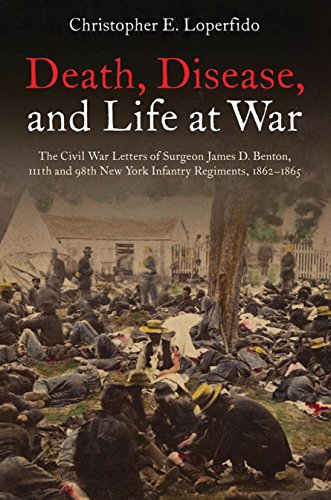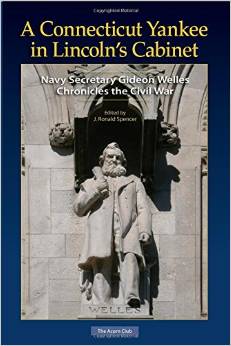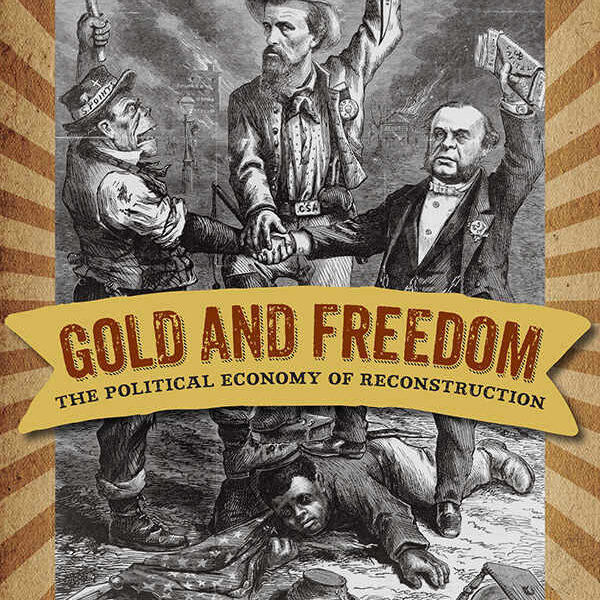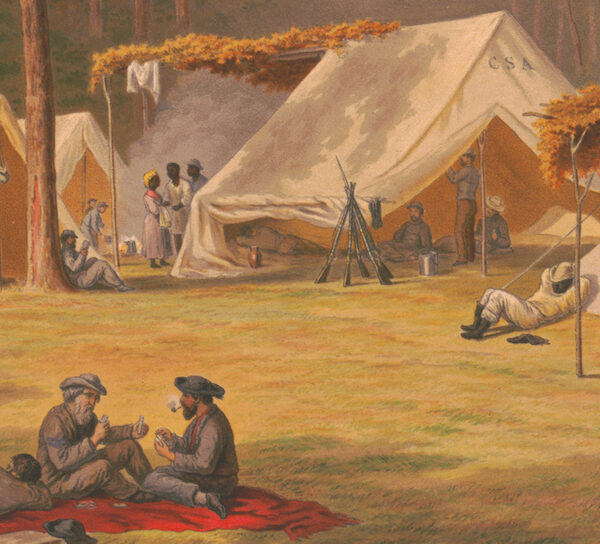Death, Disease, and Life at War: The Civil War Letters of Surgeon James D. Benton, 111th and 98th New York Infantry Regiments, 1862-1865 edited by Christopher E. Loperfido. Savas Beatie, 2018. Paper, IBSN: 978-1611213591. $16.95.
 The Civil War was a watershed moment in the development of medical science. Studies of the war’s medical aspects have multiplied in recent years, as have biographies of some of the leading surgeons of both armies. However, as Christopher E. Loperfido points out in his book, primary source material and biographical information from front line and regimental surgeons remain scarce. Loperfido’s work, which centers around the letters of New York surgeon James D. Benton, seeks to fill this void.
The Civil War was a watershed moment in the development of medical science. Studies of the war’s medical aspects have multiplied in recent years, as have biographies of some of the leading surgeons of both armies. However, as Christopher E. Loperfido points out in his book, primary source material and biographical information from front line and regimental surgeons remain scarce. Loperfido’s work, which centers around the letters of New York surgeon James D. Benton, seeks to fill this void.
Young James Benton took up his medical profession in 1859, while still in his early twenties. Benton did not enlist for the Union cause immediately. But by the summer of 1862, amidst the nationwide call for 300,000 volunteers, he sold his medical practice and joined the 111th New York as a medical officer. Benton freely admitted that he joined the United States Army to get paid and support his family back home.
Benton and his comrades found themselves thrown quickly into the fire when they joined the garrison at Harpers Ferry in late August 1862. A few weeks into their service, “Stonewall” Jackson’s Confederates made the New Yorkers prisoners of war. They spent months of their early service confined in Camp Douglas outside Chicago.
The letters of James Benton afford insight into the mindset of the so called “Harpers Ferry Cowards” in their purgatorial stay in Chicago. Benton’s travels during the war took him to Washington, D.C. (during one of his visits, he was present for Abraham Lincoln’s Second Inauguration), Gettysburg, Petersburg, and Richmond.
Throughout his correspondence, Benton never shies away from sharing his opinion. He comments on command decisions in the Army of the Potomac, such as the non-assault on Mine Run; the Election of 1864; and the abolition of slavery as a war aim, among others.
The real benefit of Loperfido’s publication of the Benton letters comes in the surgeon’s descriptions of everyday life in that role. Reading Benton’s correspondence chronologically traces the natural progression of a Civil War surgeon learning and adapting the tools of his trade to the situation in the field. His April 5, 1863 letter from Centreville, Virginia, for example, details the wounding of a picket, how the bullet passed through the soldier’s body, and what treatment Benton applied to save the wounded Federal.
Aside from being a frontline surgeon, James Benton likewise served in a division hospital during the Petersburg Campaign. Here, Benton wrote, he had better accommodations than when he was serving directly with his unit. Near the war’s end, Benton transferred to the 98th New York Infantry. In April 1865, he marched with his unit through the charred streets of the captured Confederate capital. There, he discovered a forgotten Bible with a name in it. Benton sought to send his captured prize to its former Confederate owner after the war.
Throughout the book, Loperfido attempts to put Benton’s life, letters, and work as a surgeon in the greater context of the Civil War and the medical advances that took place from 1861 to 1865. He compiled a team of Civil War medicial historians to write several appendices for the book that cover topics such as Jonathan Letterman and the development of the United States Army Medical Corps, a look at amputations in the war, and a helpful discussion of the use of lint by surgeons on the battlefield.
At times, Loperfido’s contextual material seems superfluous and unrelated to Benton’s story. For example, he provides summations of the Fredericksburg and Chancellorsville Campaigns, neither of which Benton participated in. Regardless, Christopher Loperfido has done the study of Civil War medicine a valuable service by bringing Benton’s stories, reactions, and firsthand accounts to light.
Kevin R. Pawlak is the author of Shepherdstown in the Civil War: One Vast Confederate Hospital (2015).




